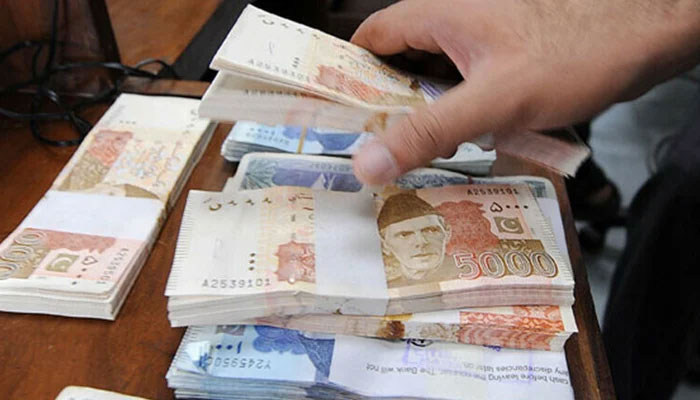Business leaders decry central bank’s rate hold
KARACHI: Industry and business leaders expressed disappointment and surprise after the State Bank of Pakistan kept its benchmark interest rate unchanged at 22percent, despite signs of economic recovery and declining inflation.
They said the current high interest regime has a devastating impact on the industrial output and overall economic growth as the high cost of borrowing has added immensely to the overall cost of production, which has risen sharply in the last two and a half years due to high utility charges and massive depreciation of the local currency against the dollar.
“The SBP’s decision to keep the monetary policy intact was very surprising as the business community expected a cut by 150 to 200 basis points due to the declining trend of inflation and signs of economic recovery which have started surfacing as the IMF and the World Bank predicted Pakistan’s GDP expanding by 2pc in FY24," Iftikhar Ahmed Sheikh, resident of the Karachi Chamber of Commerce & Industry (KCCI) told The News.
Sheikh said the unprecedentedly expensive borrowing rate has caused too much loss to the economy, particularly the cost of doing business, which has grossly suppressed the manufacturing sector.
“The finance minister also recently hinted at a rate cut and we, during our recent meeting with Prime Minister Shehbaz Sharif, also requested to look into the possibility of a rate cut which, unfortunately, has not been done due to reasons best known to the SBP,” he added.
Asif Inam, chairman of the All Pakistan Textile Mills Association (APTMA), noted the policy rate should be in single digit, if we want economic growth and a jump in the country’s exports.
President of the Korangi Association of Trade and Industry (KATI), Johar Ali Qandhari, expressed concern over the SBP's decision to persist with the interest rate at 22 percent for the seventh consecutive term, cautioning that such a move could spell disaster for the industry.
Qandhari asserted that the high interest rate poses a formidable barrier to achieving economic objectives, exacerbating challenges faced by businesses."Despite promising economic indicators and a consistent decline in inflation, industrialists were left disheartened as their expectations of a reduction in the interest rate were dashed by the State Bank's decision."
President KATI attributed the country's high inflation and declining growth rate to the persistently high interest rate, lamenting the adverse impact on industrial growth and capital shortages.
He urged the government to heed industrialists' demands and immediately reduce the interest rate to 13 percent. Such a measure, he argued, would mitigate industry challenges, lower production costs, and provide access to affordable loans, thereby stimulating investment and economic growth in the country.Javed Bilwani, chairman of the Pakistan Apparel Forum, said that trade and industry couldn’t sustain in this high interest regime.
He pointed out that big industrialists have managed to keep their businesses running, but the small industries have undergone immense hardships after the interest rate was hiked to its historic high.
Bilwani said that people are not keeping their money in banks to earn the profits rather than investing in the industries because the cost of borrowing is so much high that industries can’t run in current conditions. He said that multiple factors i.e. stable exchange rate, low utility charges and low interest rates are needed to register growth in the exports.
-
 Woman Jailed Over False 'crime In Space' Claim Against NASA Astronaut
Woman Jailed Over False 'crime In Space' Claim Against NASA Astronaut -
 James Van Der Beek’s Close Pal Reveals Family's Dire Need Of Donations
James Van Der Beek’s Close Pal Reveals Family's Dire Need Of Donations -
 Prince William And Harry's Cousins Attend 'Wuthering Heights' Event
Prince William And Harry's Cousins Attend 'Wuthering Heights' Event -
 Hailey Bieber Turns Heads Just Hours After Major Business Win
Hailey Bieber Turns Heads Just Hours After Major Business Win -
 King Charles' Andrew Decision Labelled 'long Overdue'
King Charles' Andrew Decision Labelled 'long Overdue' -
 Timothee Chalamet 'forever Indebted' To Fan Over Kind Gesture
Timothee Chalamet 'forever Indebted' To Fan Over Kind Gesture -
 Columbia University Sacks Staff Over Epstein Partner's ‘backdoor’ Admission
Columbia University Sacks Staff Over Epstein Partner's ‘backdoor’ Admission -
 Ozzy Osbourne's Family Struggles Behind Closed Doors
Ozzy Osbourne's Family Struggles Behind Closed Doors -
 Dua Lipa Claims Long-distance Relationship 'never Stops Being Hard'
Dua Lipa Claims Long-distance Relationship 'never Stops Being Hard' -
 BTS Moments Of Taylor Swift's 'Opalite' Music Video Unvieled: See Photos
BTS Moments Of Taylor Swift's 'Opalite' Music Video Unvieled: See Photos -
 Robin Windsor's Death: Kate Beckinsale Says It Was Preventable Tragedy
Robin Windsor's Death: Kate Beckinsale Says It Was Preventable Tragedy -
 Rachel Zoe Shares Update On Her Divorce From Rodger Berman
Rachel Zoe Shares Update On Her Divorce From Rodger Berman -
 Kim Kardashian Officially Takes Major Step In Romance With New Boyfriend Lewis Hamilton
Kim Kardashian Officially Takes Major Step In Romance With New Boyfriend Lewis Hamilton -
 YouTube Tests Limiting ‘All’ Notifications For Inactive Channel Subscribers
YouTube Tests Limiting ‘All’ Notifications For Inactive Channel Subscribers -
 'Isolated And Humiliated' Andrew Sparks New Fears At Palace
'Isolated And Humiliated' Andrew Sparks New Fears At Palace -
 Google Tests Refreshed Live Updates UI Ahead Of Android 17
Google Tests Refreshed Live Updates UI Ahead Of Android 17




